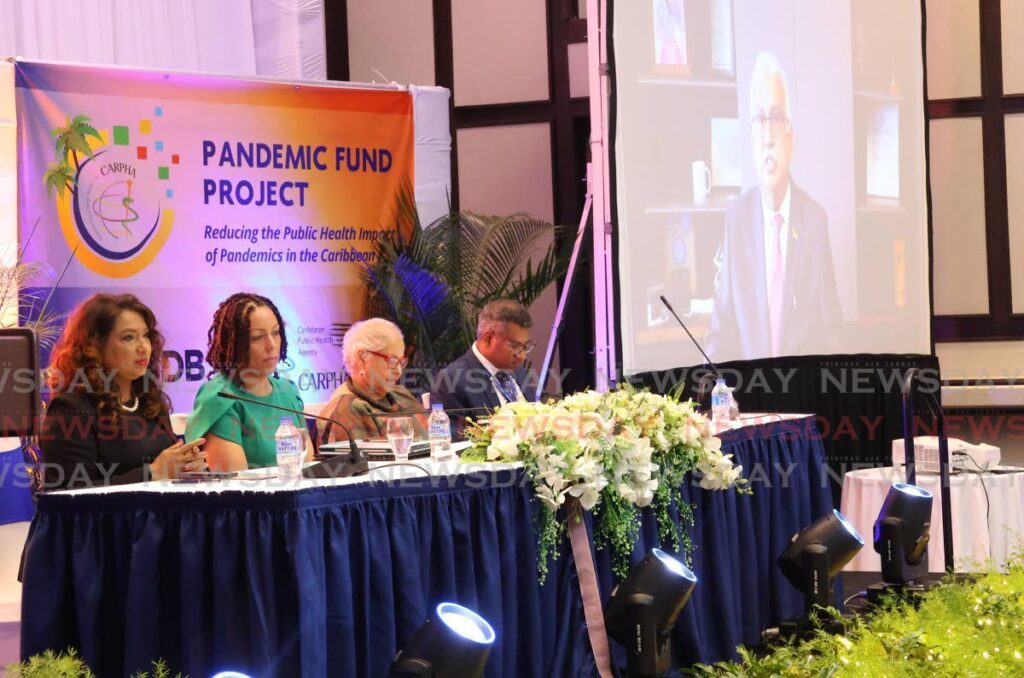Carpha: Caribbean not ready for another pandemic

THE Caribbean is not yet prepared for another pandemic.
Interim executive director of the Caribbean Public Health Agency (Carpha) Dr Lisa Indar made the assertion as Carpha held a regional consultation workshop on its Pandemic Fund Project on August 5 at the Trinidad Hilton.
The fund was established in September 2022 and is part of Carpha’s pandemic prevention, preparedness, and response (PPR) programme.
It is a financing mechanism dedicated to providing multi-year grants to help low and middle-income countries be better prepared for future pandemics.
The money from the grant can be used to improve high-priority PPR capabilities such as comprehensive disease surveillance and early warning systems (EWS), laboratory systems, and human resources and public health and community workforce capacity.
The fund’s first call for proposals aims to reduce the public health impact of pandemics in the Caribbean through PPR.
The project comprises five components which are strengthening and expanding integrated EWS, expanding of laboratory systems, workforce development, regional strategic co-ordination, collaboration and commitment to pandemic response, and monitoring, evaluating, and project management.
Speaking with the media at the workshop, Indar, who is also the director for the funding project said the covid pandemic highlighted the many gaps in the region’s pandemic preparedness.
“If you are moving very quickly between countries you need to know something real time. So we lack functional real time early warning systems that can pick up something very quickly and alert somebody at the same time.”
She said covid taught the region some valuable lessons.
“We also learned that we had to build capacity. But building capacity in the Caribbean, you cannot apply a ‘one shoe fits all’ policy. There were countries that were very small and you needed to train them in identification. Then they were the big countries and so you had to have a different type of capacity building.”
Indar noted although the Caribbean was relatively small, transporting samples for testing within the region could be troublesome.
“Sample transport was another issue when all the planes stopped flying for covid. Even now, there is a bit of a distance in terms of flying samples. We have to find ways and ask ourselves, ‘How do you get samples quickly?’”
She said there needs to be greater co-ordination among regional health bodies in the Caribbean if the region is to deal effectively with another pandemic.
“We still operate in silos so we have to move (away from) that. The agencies have to talk to each other. They have to share data. There must be a trust among the agencies and a partnership. We need to walk that talk.”
Indar said she intended to use the fund as a catalyst to encourage change management.
“It is my intent to change how we operate, and our thinking. We need to believe that we as the Caribbean could lead in this real time surveillance system.
“If something is happening, we must know and we must be able to detect and respond quickly. We must have the regional co-ordination to support it.”
Describing the workshop as a milestone, Health Minister Terrence Deyalsingh said the fund came at an opportune time.
Deyalsingh noted infectious diseases continue to wreak havoc on the public-health system of many countries.
“Between 2000 and 2024, the world faced the covid pandemic, the SARS and MERS epidemics and the swine flu. We have also seen recently a resurgence of measles and dengue with over 62 million deaths across these dark times.”
“Diseases such as human immunodeficiency virus (HIV), cholera, dengue fever, chikungunya, zika, norovirus and other food borne diseases, antimicrobial resistant organisms, influenza and covid have all been major causes of epidemics at the local, regional and as well as a global level.”
He urged the various country representatives to ask themselves hard questions and provide honest answers.
“If another pandemic would unexpectedly come tomorrow… are your health systems ready to respond? If not, what changes are needed for them to be ready? Are there operational digitised surveillance and laboratory systems supported by an adequate workforce to identify new and emerging public health threats in a timely manner? What did you learn from covid19 and what are you doing differently? Are your systems proactive or reactive? Are you ready?”
Deyalsingh praised Carpha as he pointed out the benefits of the fund.
“This fund allows investments towards coordinated action to build stronger, more resilient health systems and mobilize additional resources for pandemic prevention, preparedness, and response across three high impact areas.”

Comments
"Carpha: Caribbean not ready for another pandemic"